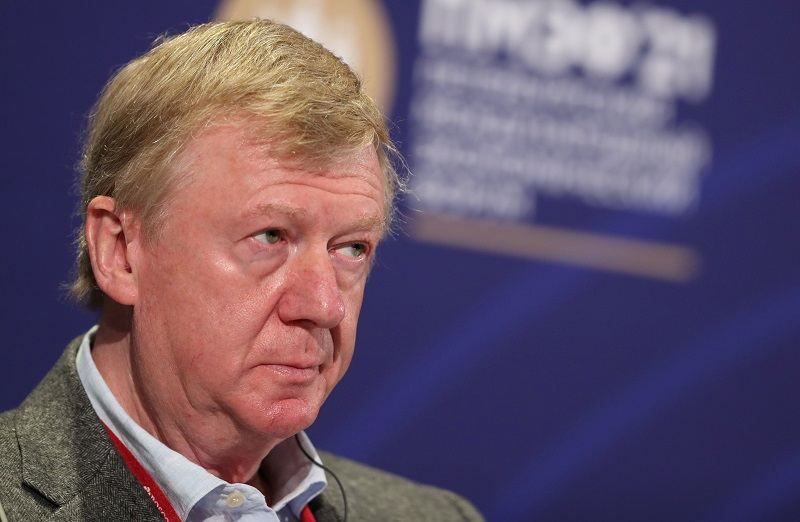Italy investigating case of hospitalized ex-Kremlin official

Anatoly Chubais, special representative of Russian President for relations with international organizations to achieve sustainable development goals, attends a session of the St. Petersburg International Economic Forum (SPIEF) in Saint Petersburg, Russia, June 3, 2021.
11:50 JST, August 4, 2022
Authorities in Italy are examining the case of a former senior Russian official who was hospitalized in Sardinia this week after suffering neurological symptoms, Italian media reported Wednesday.
Anatoly Chubais, who resigned as the Kremlin’s climate envoy soon after Russia invaded Ukraine, was in intensive care after suddenly falling ill at a resort on the island.
According to Ksenia Sobchak, a Russian TV personality identified by the Associated Press as a family friend, Chubais was diagnosed with Guillain-Barré syndrome, a rare neurological disorder in which the immune system mistakenly attacks healthy nerves.
Symptoms include tingling in the feet or hands, muscle weakness and difficulty with vision, speaking or eating. Italian authorities, however, including Sardinia’s public prosecutor, are awaiting test results in order to definitively rule out poisoning, Italy’s ANSA news agency reported.
Chubais’s symptoms include partial facial paralysis and a loss of feeling in his arms and legs, Sobchak wrote in a Telegram post Wednesday that featured a photo of the 67-year-old in a hospital bed.
The prosecutor’s office and Mater Olbia Hospital where he is being treated did not immediately respond to requests for comment. There is no clear public evidence that Chubais was poisoned – and Kobchak, the daughter of a former mentor to Russian President Vladimir Putin, has dismissed the reports as speculation.
But his sudden symptoms recalled several instances where former Russian spies or prominent dissidents abruptly fell ill – and were later found to have ingested radioactive material or a military-grade nerve agent.
U.N. experts last year blamed Russia’s government for the near-fatal poisoning of leading opposition figure, Alexei Navalny, with the Soviet-era nerve agent Novichok.
Kremlin spokesman Dmitry Peskov on Monday called Chubais’s hospitalization “sad news” and said the Kremlin did not have details about what happened.
In March, Chubais became the most senior official to cut ties with the Kremlin after the invasion of Ukraine. He quit his post and reports at the time indicated he fled the country.
A member of former Russian president Boris Yeltsin’s Cabinet after the fall of the Soviet Union, Chubais is known as one of the few Russian reformers from the 1990s who remained in politics through Putin’s presidency, although he was not considered to be a part of Putin’s inner circle.
He became unpopular among Russians for championing the “loans-for-shares” privatization deal in the mid-1990s that gave rise to Russia’s oligarchs. Chubais also reportedly supported the development of Putin’s career, and Putin gave him a position as an adviser on sustainable development after he was dismissed from a state nanotechnology firm in December 2020.
In late February, Chubais turned to Facebook to commemorate the anniversary of the murder of pro-democracy politician Boris Nemtsov, who was shot in 2015 after criticizing Putin’s annexation of Crimea. Avdotya Smirnova, Chubais’s wife, signed an open letter from philanthropists to Putin that month opposing the war in Ukraine.
"News Services" POPULAR ARTICLE
JN ACCESS RANKING







